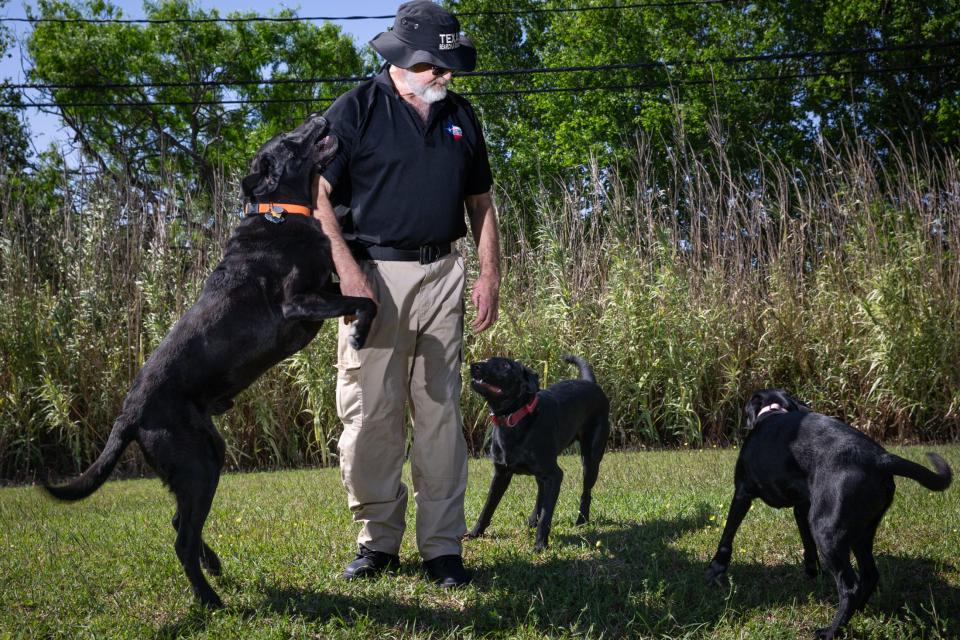Heroic noses: Talented dogs of K-9 search and rescue unit help sniff out missing people
With their excellent sense of smell, dogs are a key part of many search and rescue (SAR) missions, constantly trained to track down scents that can lead to clues about missing persons and sometimes solve cold cases.

One organization that partners with law enforcement to provide K-9 units is Texas Search and Rescue, or TEXSAR, a nonprofit with headquarters in Austin and more than 250 volunteers who assist primarily with ground searches of brush and vegetated areas throughout the state, with teams in Central Texas, Houston/Galveston, Dallas/Fort Worth and the Coastal Bend.
Formed in 2004, the group is celebrating its 20th anniversary this year.
The SAR missions run the gamut of first response, deploying volunteers who are equipped with aerial assets, drones, airplanes, helicopters and, more recently, mounted horses to assist with searches to find lost, missing or endangered people and with responding to natural disasters.
Both handlers and K-9s are nationally certified for field operations, with the team conducting local, regional and state K-9 SAR trainings weekly. About 26 dogs are currently a part of the team, with five in training and the others deployed to assist with ground searches.
Among the dogs in the K-9 SAR unit are three labrador retrievers who were in Corpus Christi recently: 12-year-old Orion and 9-year-old Aalta, who are certified, and two-and-a-half-year-old Anubis, who is not certified.
In most of TEXSAR's missions, state, local and federal agencies, police departments, relief organizations or the Governor of Texas will contact the group requesting assistance or to determine which resources it can provide. While the group does not self-deploy, someone from TEXSAR leadership may reach out to local agencies or police departments to offer help if they have heard about a missing person, he said.
Many missions are scheduled several weeks or a month in advance, and the response team will spend time and effort looking at historical maps of searchable areas to chart changes in geography or logistics.
The organization will not show up to conduct a search without law enforcement present and acts as an extension of that agency, he said.
“Ground searchers and K-9 are the backbone of TEXSAR,” said Todd Snyder, director of the TEXSAR missing person unit.
More than half of TEXSAR deployments since 2013 have been missing persons cases, according to data on the TEXSAR website, accounting for 48% of missions in 2022, followed by 38% for force multipliers, 11% for evidence search and 3% for flood support. As a result, the Missing Persons Unit was launched in March of 2023, with Snyder hired to lead the team. Since then, the MPU has been working with local law enforcement agencies, including the Corpus Christi Police Department (CCPD), to manage missing person caseloads.
Live find dogs, or area dogs, are scent-specific dogs that are specially trained to find a human body in the area within about five minutes, whereas a ground searcher, or “ground pounder,” might take an hour.
K-9s are keen at discerning between the chemical odors emitted by human remains and those of other animals. If presented with an object such as a bone, K-9 units will go out and walk in concentric circles to try to find the other remains.
To compensate for how much ground they have to cover, search and rescue crews will look at the terrain and vegetation in a search area and consider factors such as the missing person’s last known location to determine how many ground pounders and K-9s will be needed, said Joe Huston, Gulf Coast Chapter Operations section chief and K-9 unit member.
Factoring in differences in natural features of the area to be searched is also key. For instance, a wide-open field of grass would require a different search tactic than a fence lined in sugarcane.
“There’s such a dynamic part to every search,” he said. “No two searches have been the same."
The other type of K-9s are cadaver dogs, trained for search for human remains. In these cases, responders must be prepared to deal with several factors, including finding bodies with disarticulated limbs. If that happens, the area will be marked with flags to alert law enforcement that evidence has been found and the responders will leave the scene.
A difficult aspect of training cadaver dogs is obtaining anatomical donations that help train them on how to find human remains. While Texas law permits anatomical donations to qualified 501(c)(3) SAR teams, hospitals and other medical facilities may simply not want to provide them.
As a result, frequent training is imperative. K-9 dogs are trained weekly on Thursday nights in Houston and one Saturday of each month. Area dogs receive training on Saturday and Sunday.
Once properly trained, the dogs often do an exceptional job. Huston mentioned a recent incident where two of the live find dogs spotted a trainer hiding in a concealed area of brush on a peninsula and jumped into a pond to swim over to the person, causing the handler to have to run around the pond to reach them.
TEXSAR's all-volunteer SAR response requires an intense and often time-consuming effort from teams. With only five paid staff and free services provided, the organization relies on donations from individuals and corporate sponsors, including HEB. Still, the unit members are proud to be able to provide food, fuel and a place to stay for those who join SAR missions.
Occasionally, the family member of a missing person will call TEXSAR requesting a search, which is a "tug of the heart," Snyder said.
"There's nothing better than bringing closure to a family," he said. "Sometimes the answers are not good or not what they want to hear, but there's closure."
This article originally appeared on Corpus Christi Caller Times: TEXSAR K-9 unit conducts search and rescue response in Texas

